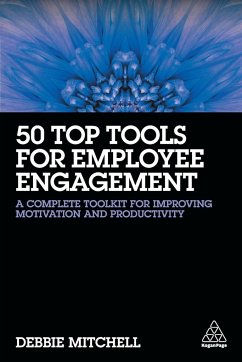
Performance Management for Agile Organizations
Overthrowing The Eight Management Myths That Hold Businesses Back

PAYBACK Punkte
14 °P sammeln!
Baker takes on eight dysfunctional people management practices originating from the scientific management and offers practical solutions for changing these practices and increasing organizational agility.Agile is the new black. Every business now has to be adaptive, nimble and ready to pivot - managers have to be comfortable with ambiguity and constantly ready for change. And yet...While agility is regarded as essential for competitive advantage, most organizations are still unthinkingly applying people management practices, rooted in Frederick Taylor's scientific management philosophy of the ...
Baker takes on eight dysfunctional people management practices originating from the scientific management and offers practical solutions for changing these practices and increasing organizational agility.
Agile is the new black. Every business now has to be adaptive, nimble and ready to pivot - managers have to be comfortable with ambiguity and constantly ready for change. And yet...
While agility is regarded as essential for competitive advantage, most organizations are still unthinkingly applying people management practices, rooted in Frederick Taylor's scientific management philosophy of the early 20th century, designed to ensure consistency and efficiency on production lines but which actively prevent the sort of creativity and flexibility needed in the modern workplace.
100 years of scientific management has led to the creation of eight performance myths. Myths that impede the agility necessary to compete in the age of the knowledge worker but which areso instinctively embedded in management psyche that they go unchallenged despite the fact that the changing world of work has rendered them dysfunctional and counterproductive.
Through case studies and examples Baker demonstrates how the right workplace culture for promoting and applying agile decision-making consists of eight values shared by employer and employee - values that are polar opposite of the values and assumptions of traditional management styles. A new psychological contract that enables the collaborative working relationship necessary for agility to flourish.
Agile is the new black. Every business now has to be adaptive, nimble and ready to pivot - managers have to be comfortable with ambiguity and constantly ready for change. And yet...
While agility is regarded as essential for competitive advantage, most organizations are still unthinkingly applying people management practices, rooted in Frederick Taylor's scientific management philosophy of the early 20th century, designed to ensure consistency and efficiency on production lines but which actively prevent the sort of creativity and flexibility needed in the modern workplace.
100 years of scientific management has led to the creation of eight performance myths. Myths that impede the agility necessary to compete in the age of the knowledge worker but which areso instinctively embedded in management psyche that they go unchallenged despite the fact that the changing world of work has rendered them dysfunctional and counterproductive.
Through case studies and examples Baker demonstrates how the right workplace culture for promoting and applying agile decision-making consists of eight values shared by employer and employee - values that are polar opposite of the values and assumptions of traditional management styles. A new psychological contract that enables the collaborative working relationship necessary for agility to flourish.














